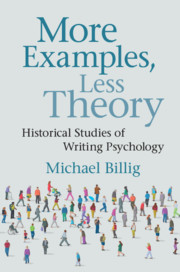1 - Introduction
Published online by Cambridge University Press: 12 September 2019
Summary
This chapter introduces the book’s basic themes: the importance of examples in psychological writing; the tension between the abstraction of theories and the concreteness of examples; how examples overspill theories; and the need to argue for these themes concretely with examples, rather than abstractly with theories. This is why the book has a dual vision. It looks back historically to examples of past psychologists and their ways of writing, and it does this to find examples of writers that psychologists of today might follow. In this introductory chapter, the later chapters of past writers are summarised. There are obvious candidates of great psychological writers, such as William James and Sigmund Freud, but the book also includes forgotten figures, such as the third Earl of Shaftesbury and one of the heroes of this book - the neglected eighteenth-century advocate of examples, Abraham Tucker.
- Type
- Chapter
- Information
- More Examples, Less TheoryHistorical Studies of Writing Psychology, pp. 1 - 12Publisher: Cambridge University PressPrint publication year: 2019



